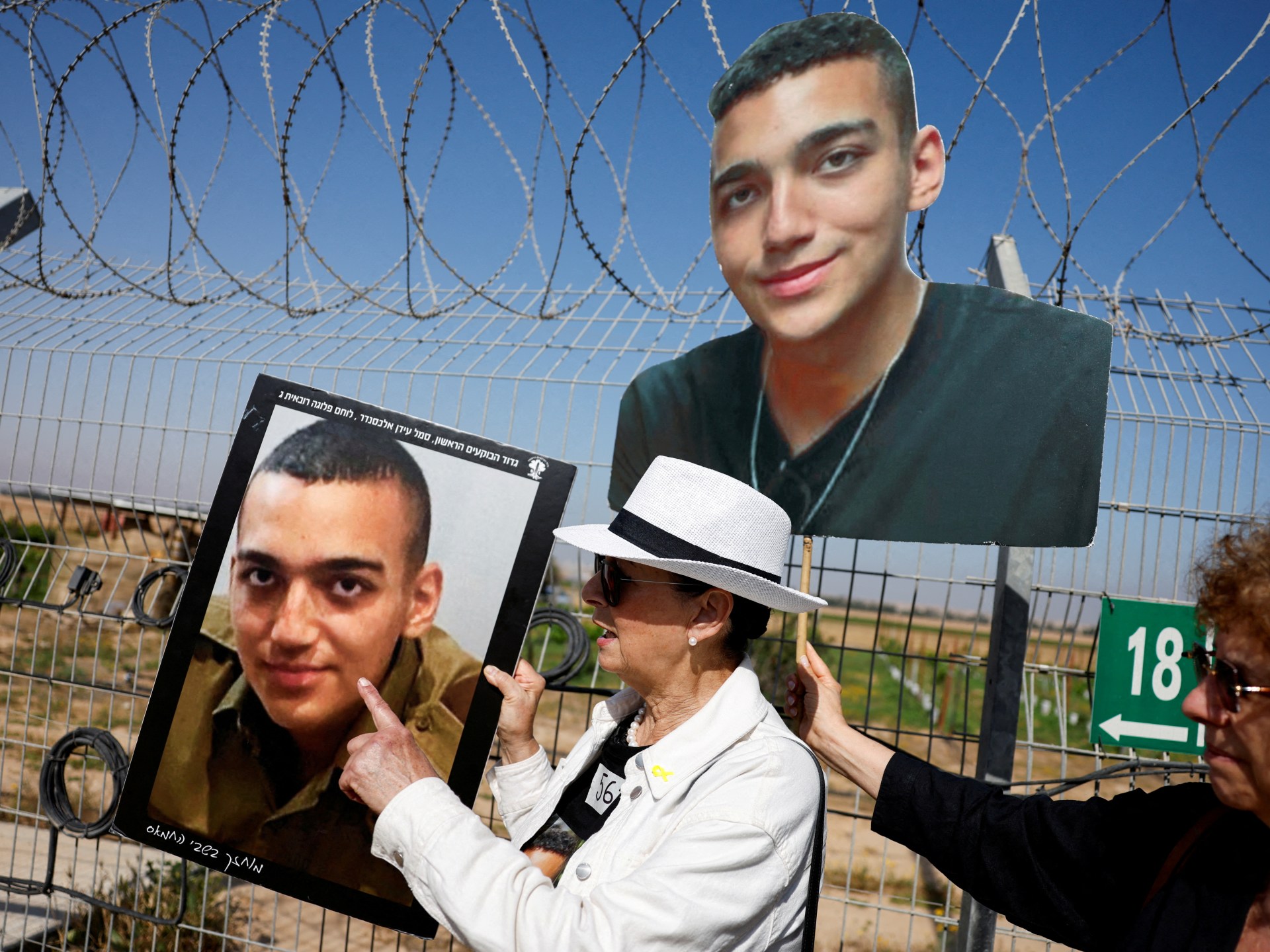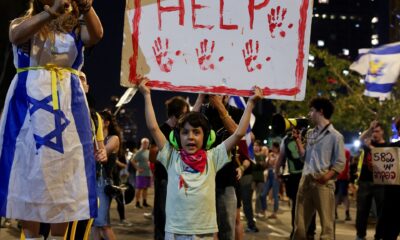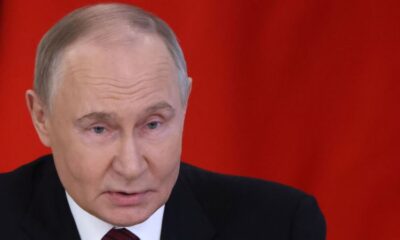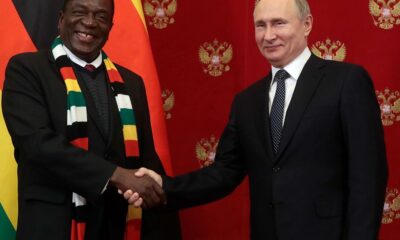Middle East
Sudan’s army and RSF paramilitary launch attacks across war-ravaged nation | Sudan war News

Port Sudan, el-Fasher, West Kordofan and West Darfur have all seen heavy fighting.
Multiple attacks by Sudan’s armed forces (SAF) and the paramilitary Rapid Support Forces (RSF) have struck various locations across the country now in its third year of a civil war.
At least nine civilians, including four children, were killed and seven injured in attacks on Sunday by the RSF in el-Fasher, the capital of North Darfur state in western Sudan, according to the Sudanese army.
During a sweep of the city, the SAF killed six RSF members and destroyed three combat vehicles, according to the statement. There was no immediate comment from the RSF on the army report.
El-Fasher is the last major city held by SAF in Darfur. For over a year, the RSF has sought to wrest control it, located more than 800km (500 miles) southwest of the capital, Khartoum, from the SAF, launching regular attacks on the city and two major famine-hit camps for displaced people on its outskirts.
In the meantime, Sudan’s civil defence forces announced on Sunday that they have full control over fires that erupted at the main fuel depot and other strategic sites in Port Sudan, the seat of the army-backed government, which has come under daily drone attacks blamed on the RSF over the past week.
The fires caused by a drone strike on the fuel depot on Monday had spread across “warehouses filled with fuel”, the Sudanese army-aligned authorities said, warning of a “potential disaster in the area”.
The Red Sea port city had been seen as a safe haven from the devastating two-year conflict between the SAF and RSF before the drone strikes began on May 4.
The attacks have damaged several key facilities, including the country’s sole international civilian airport, its largest working fuel depot and the city’s main power station.
On Tuesday, Sudanese authorities accused the RSF of being behind the drone strikes. The RSF has not commented on the allegations.
Port Sudan is the main entry point for humanitarian aid into Sudan. United Nations Secretary-General Antonio Guterres warned that the attacks “threaten to increase humanitarian needs and further complicate aid operations in the country”, his spokesman said.
Sudan’s army launched air strikes on the RSF in el-Khuwei in West Kordofan state and the state of West Darfur late on Saturday. El-Khuwei was captured by the RSF last week.
Activists and Sudanese accounts shared a video clip on social media showing the Sudanese army and their allied forces announcing that they had regained control over el-Khuwei after battles with the RSF on Sunday, according to Al Jazeera’s Sanad fact-checking agency.
Witnesses also reported drone strikes on Sunday, targeting the airport in Atbara, a city in the northern state of River Nile.
The RSF has been battling the SAF for control of Sudan since April 2023. The civil war has killed more than 20,000 people, uprooted 15 million and created what the UN considers the world’s worst humanitarian crisis.
Middle East
Trump visits Saudi Arabia, Qatar, UAE: What to know | Donald Trump News

United States President Donald Trump will undertake a three-day tour of the Gulf for his first state visit since retaking office in January.
The trip begins in Saudi Arabia, followed by Qatar and the United Arab Emirates.
It marks Trump’s second foreign visit as president after he attended Pope Francis’s funeral in Rome in April.
Here is what to know about the trip and what is on the agenda:
When and where is Trump visiting?
Trump will fly out of the US on Monday and start his trip in the Saudi capital, Riyadh, on Tuesday.
He is expected to attend a Gulf summit in the city on Wednesday, visit Qatar later that day and conclude his visit in the UAE on Thursday.
Saudi Arabia was the first country Trump visited during his first term as well, breaking the tradition of US presidents starting with the United Kingdom, Canada or Mexico.

What is on Trump’s agenda?
His objectives are securing major economic deals and making diplomatic progress on issues that impact the region, including a Gaza ceasefire and stalled Saudi-Israel normalisation talks.
The focus on economic deals comes as the US recorded a drop in its economic output in the first quarter, its first in three years.
On Wednesday, Trump said he will also decide during his trip how the US refers to the “Persian Gulf”.
US media reported that he may decide to refer to the body of water as the Arabian Gulf or the Gulf of Arabia.
Saudi Arabia: Normalisation, business deals and weapons
Trump’s Middle East envoy Steve Witkoff said the president wants to expand the Abraham Accords, under which the UAE and Bahrain recognised Israel during Trump’s first term, to include Saudi Arabia.
Talks were reportedly under way on Saudi Arabia joining the accords, but after Israel began its war on Gaza in October 2023, Saudi Crown Prince Mohammed bin Salman (MBS) paused those discussions.
Saudi officials have said they won’t move forward unless there is real progress towards a two-state solution for Palestine, leading to speculation that Trump may propose a US-backed framework to end the war and revive normalisation efforts during this visit.
In a shift from past US policy, the Trump administration has uncoupled discussions on a Saudi nuclear agreement and normalisation with Israel, which US President Joe Biden’s administration had held as a condition for nuclear cooperation.
Riyadh wants US help building a civilian nuclear programme, which Israel has raised concerns about and had wanted it tied to normalisation.
Trump’s main focus will be economic partnerships as he meets with MBS and attends a Saudi-US investment forum. He wants to secure a $1 trillion Saudi investment in US industries, expanding on a $600bn pledge made by the crown prince earlier this year.
Saudi Arabia is also expected to announce more than $100bn in US arms purchases, including missiles, radar systems and transport aircraft.
Other key issues include reviving a scaled-down US-Saudi defence pact.

UAE: Investment in the US and cooperation on tech goals
In the UAE, Trump is to meet with President Mohammed bin Zayed Al Nahyan to discuss investment opportunities in sectors such as artificial intelligence, semiconductors, energy and manufacturing.
In March, the UAE announced a $1.4 trillion investment plan for those sectors in the US over the next decade.
Meanwhile, Trump is expected to lift Biden-era export restrictions on advanced technology as the UAE seeks US microchips and artificial intelligence technology to support its goal of becoming a global AI leader by 2031.
Qatar: Military cooperation, regional security and Syria
In Qatar, where the largest US military base in the Middle East is located, Trump’s agenda includes meetings with the emir, Sheikh Tamim bin Hamad Al Thani, to discuss military cooperation and regional security.
Doha, which has close ties with Syria’s new president, Ahmed al-Sharaa, may also seek Trump’s support in easing sanctions on Syria.
As a key partner in regional mediation, Qatar is also expected to discuss Gaza ceasefire efforts with Trump.

Why is Israel not on the itinerary?
Trump’s decision to skip Israel during this tour comes amid heightened tensions in Gaza, where Israel’s military has intensified its operations after breaking a ceasefire on March 18.
“Nothing good can come out of a visit to Israel at the moment,” a US official told the Axios news website.
Since it broke the ceasefire, Israel has continued extensive air strikes on Gaza while voicing concerns over what it sees as a decline in US support.
Recent reports from US and Israeli media also suggest growing tensions between Trump and Israeli Prime Minister Benjamin Netanyahu as the Trump administration signals it may act independently on Middle East policy without waiting for the Israeli leader.
Israeli political commentator Ori Goldberg told Al Jazeera: “At the moment, Israel is at odds with [Trump’s] overall goal, promising continuous fire.
“I think the mistrust between Trump and Netanyahu has been quite extensive for some time.”
How are countries responding to this visit?
In the lead-up to Trump’s visit, Saudi Arabia, Qatar and the UAE pledged significant investments in the US, signalling an interest in deepening economic ties.
However, Trump’s trip also follows resistance in the region over his proposal for the US to redevelop Gaza and relocate its residents to other Arab countries.
In a meeting of Arab leaders in Riyadh in February, officials from countries including Egypt, Qatar, the UAE and Kuwait rejected Trump’s plan, emphasising the need for Palestinian self-determination and regional stability.
Middle East
Israel committed to ‘intensified’ Gaza operation despite US captive release | Gaza News

Israeli PM says negotiations with Hamas will continue ‘under fire’, with just a pause for the planned release of Edan Alexander.
Israel has not agreed to any ceasefire or prisoner swap with Hamas ahead of the expected release of Israeli-American soldier Edan Alexander, but is continuing to prepare to intensify its military operations in Gaza, its prime minister has stated.
Prime Minister Benjamin Netanyahu’s office said in a statement released on Monday that ceasefire negotiations “will continue under fire, during preparations for an intensification of the fighting”. The Israeli leader insisted that military pressure had forced Hamas to make the release.
“Israel has not committed to a ceasefire of any kind” or the release of Palestinian prisoners, but has only agreed to allow safe passage for the release of Alexander, the last surviving United States captive held in Gaza, the statement said.
A Hamas source told the AFP news agency later on Monday that mediators had informed the Palestinian group that Israel would pause military operations in Gaza for the handover.
‘Final deal?’
Hamas said on Monday that Alexander’s release was imminent. The armed group agreed to release him as a goodwill gesture to US President Donald Trump, who is due to arrive in the Middle East later.
The previous day, the Palestinian group had revealed that it had agreed to the release in talks with the US. Arab mediators Qatar and Egypt called it an encouraging step towards a return to ceasefire talks for war-torn Gaza.
Khalil al-Hayyah, a Hamas leader in Gaza, said the group was ready to “immediately start intensive negotiations” to reach a final deal for a long-term truce, including an end to the war, the exchange of Palestinian prisoners and remaining Israeli captives in Gaza, and the handing over of power in the enclave to an independent body of technocrats.
Alexander’s family said they hoped the decision would open the way for the release of the 59 other captives, only 21 of whom are believed to be alive.
Families of the captives and their supporters in Israel have pressed the government to reach a deal to secure the release of those still held in Gaza, but Netanyahu has faced heavy pressure from hardliners in his cabinet not to end the war.
Last week, Netanyahu announced that Israel plans a total conquest of Gaza in an intensive military operation. Israeli officials have said that the step-up in military action would not start until Trump wraps up his Middle East visit.
Israel continues to bombard the enclave.
Gaza’s Civil Defence agency reported on Monday that several people were killed and many more injured in an overnight air attack on a school housing displaced people.
“At least 10 [dead], including several women and children, as well as dozens of wounded, were transported following an Israeli air strike on the Fatima Bint Asad school, which is home to more than 2,000 displaced people in the city of Jabalia,” Civil Defence spokesman Mahmoud Basal said.
Israeli forces also continued attacks across the Gaza Strip, including Gaza City in the north, Rafah in the south and the Nuseirat refugee camp in the centre.
Middle East
Hamas says it will release US-Israeli captive Edan Alexander | Israel-Palestine conflict News

Hamas has said it will release a US-Israeli captive held in Gaza, as the group confirmed it was engaged in direct talks with the United States towards securing a ceasefire in the war-ravaged enclave and getting aid flowing again to a suffering Palestinian population.
The Palestinian group released a statement on Sunday: “Israeli soldier Edan Alexander, a dual US national, will be released as part of efforts towards a ceasefire” and the reopening of aid crossings. Israel has blocked all aid, including food, medicine and fuel, for 70 days.
The Hamas statement did not indicate when the 21-year-old Alexander would be released, but it is thought to be in the coming 48 hours.
Israeli media reported that US envoy Steve Witkoff will be in Israel on Monday as part of the deal.
The announcement comes shortly before US President Donald Trump’s visit to the Middle East this week – which does not include a trip to Israel. Trump and Witkoff have frequently mentioned Alexander by name in the past few months.
Alexander, who grew up in the US, was taken from his military base during the October 7, 2023 Hamas-led attack.
In its statement on Sunday, Hamas said it was willing to “immediately begin intensive negotiations” that could lead to an agreement to end the war and would see Gaza under a technocratic and independent administration.
“This will ensure calm and stability for many years, along with reconstruction and the end of the blockade,” the group said.
There was no immediate comment from the Trump administration.
Israeli Prime Minister Benjamin Netanyahu’s office said on Sunday that the US told Israel that Hamas’s freeing of Alexander would lead to negotiations for the release of more captives. The statement added that Israel’s policy hasn’t changed: negotiations will be conducted under fire with a continued commitment to achieving all war objectives.
‘A lot of questions’
Al Jazeera’s Hamdah Salhut, reporting from Amman, Jordan, said: “It’s unclear exactly what kind of reaction the Israeli government officials had with these direct talks between Hamas and the United States, but last time they were quite angry and that’s because the Israelis weren’t involved and had no knowledge of those talks and the Americans hit back by saying they didn’t need anyone’s permission to negotiate with any of the actors involved because they were American captives held in Gaza”.
“There are a lot of questions from a lot of different angles, specifically from the family members of those captives, from the larger part of Israeli society who have been protesting in the thousands for more than 1.5 years, accusing Benjamin Netanyahu of prolonging the war for his own personal and political gain. And in fact, Israeli officials have been saying the quiet part out loud in recent weeks, saying that the captives were not the main priority for the Israeli government and that they had other goals and objectives they needed to achieve”, she added.
“The family members of captives say that the Israeli government is choosing land grabs over the lives of Israelis who are still being held in Gaza”, she continued, referring to the Israeli government’s decision to expand its offensive in Gaza with a view to reoccupying parts of the territory.
Talks ongoing in Doha
Earlier on Sunday, two Hamas officials told the AFP news agency that talks were ongoing in the Qatari capital of Doha with the US and reported “progress” had been made.
One Hamas official, speaking about the talks with the US, said there was “progress made … notably on the entry of aid to the Gaza Strip” and the potential exchange of captives for Palestinian prisoners in Israeli custody.
A second official also reported progress “on the ceasefire in the Gaza Strip”.
Israel shattered the last ceasefire, which lasted two months, on March 18, launching a major offensive in Gaza and ramping up its bombardment of the territory.
It has also cut off all aid to Gaza since March 2, saying it would pressure Hamas to release the remaining captives. None have been released since the fleeting truce earlier this year, when several captives were exchanged for Palestinian prisoners.
A total of 59 captives are still in Gaza, around a third of them believed to be alive, after most of the rest were released in ceasefire agreements or other deals.
Starvation has taken hold across Gaza due to the Israeli blockade.
Earlier this month, the Israeli government approved plans to expand its offensive in the Gaza Strip, with officials talking of retaining a long-term occupying presence there.
The Health Ministry in Gaza said on Sunday that at least 2,720 people have been killed since Israel resumed its assault, bringing the overall Palestinian death toll since the war broke out to 52,829.
-

 Conflict Zones2 days ago
Conflict Zones2 days agoExplosions, violations reported after India and Pakistan agree ceasefire | Conflict News
-

 Middle East2 days ago
Middle East2 days agoIsraeli protesters in Tel Aviv demand an end to war on Gaza | Israel-Palestine conflict News
-

 Sports1 day ago
Sports1 day agoShedeur Sanders aiming to ‘prove himself right’ instead of other ‘people wrong’ as he begins NFL career
-

 Europe2 days ago
Europe2 days agoPutin says Russia is ready for direct talks with Ukraine
-

 Middle East2 days ago
Middle East2 days agoIsrael capitalises as Gaza fatigue sets in | TV Shows
-

 Asia2 days ago
Asia2 days agoThousands of hermit crabs seized after being found smuggled in suitcases
-

 Africa1 day ago
Africa1 day agoPutin hosts talks with African leaders on security
-

 Europe1 day ago
Europe1 day agoPope Leo XIV: A White Sox fan who calls his brother daily from Rome




